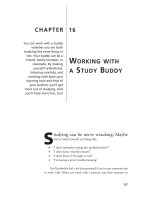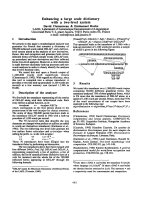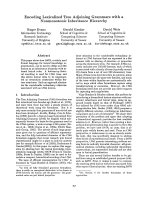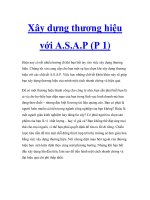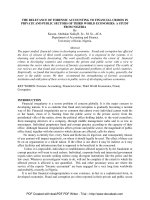Working with a study budy 1 pot
Bạn đang xem bản rút gọn của tài liệu. Xem và tải ngay bản đầy đủ của tài liệu tại đây (68.88 KB, 6 trang )
HOW TO STUDY
136
Practice Tips
The next time you’re talking with someone, whether it’s a family mem-
ber, friend, or colleague, try using sensitive talk.
• Make sure you heard what the other person intended to say.
After your friend or colleague has spoken, say something like, “I
heard you say . . . Was that what you meant?”
• Keep in mind the magic word “I.” When you disagree with
something, don’t state a fact, state your opinion. Personalize your
reaction by saying something like, “I see it like this ”
• In a notebook, write what it was like for you to use sensitive talk
in everyday conversation.
Have an instant buddy session with a classmate. (Maybe you’re doing
this already!) After class, begin a reflective discussion. Ask somebody
that you’re comfortable with a question like, “What did you think of
what the teacher said about the national debt in today’s class?”
137
CHAPTER
17
BEING YOUR
OWN PARTNER
You’ve been working
closely with your study
buddy, and now you’re on
your own. Or, for whatever
reason, you never had a
study partner. What can
you do to make up for the
fact that you don’t have
anyone whom with to
share ideas and
interpretations, or to
exchange questions and
answers? You can treat
yourself as your
own buddy!
M
any students say what they like best
about working with a partner is that it takes the heat off.
There’s less stress when you’re sharing the pressure with
someone else. And two heads are often better than one. But if, for
whatever reason, you don’t have a study buddy, you can reap the
benefits of working in a pair by pretending there’s someone else in the
room. You can imagine yourself as your own partner, your own coach.
It’s not very difficult, and it can actually be fun!
What, No Study Buddy?
Jill was stumped. She’d been studying sociology with Jack, and
now his work schedule changed, leaving no mutual free time for
them to meet. She approached other classmates, trying to begin
another study-buddy relationship, but none of them had a sched-
ule that matched hers. She was on her own.
“This is a problem,” she said to herself. “I need somebody to
act as a sounding board to hear my thoughts and conclusions on
the sociology readings. I need help coming up with an idea for my
paper, and I really need somebody to get me going so that I can
study for the final!”
HOW TO STUDY
138
BE YOUR OWN HELP-MATE
What did you like about working with a study buddy? (If you haven’t
worked with a partner yet, what do you think you’d like about working
with a study buddy?)
Write your responses in your notebook or record them on your tape
recorder. Then try to recreate a study buddy session using your notes.
TALK TO YOURSELF!
Since you are your own partner now, talk to yourself like your partner
would; it will trigger your thinking.
• Talk as you’re planning.
Jill, after losing Jack as a partner, now talks to herself before tack-
ling a new subject. She then writes in her notebook what she’s
expecting to read and what she knows about the subject already.
• Talk as you’re doing.
Jill says out loud, then writes, what makes sense to her, and what
questions come to mind as she studies.
Find Out!
BEING YOUR OWN PARTNER
139
• Talk afterwards.
Jill says out loud, then writes, answers to the questions she can
answer, and goes back to the text for answers to the rest of her
questions. She does a mini oral presentation for herself to sum up
what she studied. She sometimes even records her presentation
on audiotape so she can play it back and listen to herself, looking
for her strengths and weaknesses.
One of the things that makes working with a buddy so helpful is
that the other person is helping you make connections. The more you
make connections with what you already know, the more you’ll find that
what you’re studying sticks in your memory. A buddy might say, “That
reminds me of when we were talking about. . . . ” And whammy—your
memory is triggered! Part of being your own buddy is giving yourself
memory triggers. For extra help on this subject, review the tips in Chap-
ter 11, “Remembering What You’ve Learned.”
THE GREAT PRETENDER
Another way to be your own partner is to pretend your buddy is sitting
next to you. This is especially helpful if you’ve been regularly working
with someone else and now you’re preparing for an exam on your own.
When Jill pretended Jack was studying with her, she could
imagine him asking her questions and responding to her answers. She
didn’t feel so alone anymore, and when she was done, she felt much
better prepared for the final.
Getting Ready to Study
Before you begin your next study session, clear your mind of other matters,
go over what you studied in your last session, and then set the agenda for
this one.
Support yourself as your buddy would. Relieve yourself of everyday
worries so that you can give all your energy and attention to studying.
Instead of talking to your partner, talk to yourself. Write, or talk into a
tape recorder for five minutes about whatever’s on your mind—how
HOW TO STUDY
140
your day’s going, what you need to do after the study session, or anything
else that you’d want to say if you had a study buddy with you. It might
seem odd at first, but it’s all part of setting the scene, so to speak, of get-
ting distractions out of the way and getting focused to study.
When this little chat session is over, review your last study session.
Think about what was useful to you. Take note of what comes to mind:
• If you learn best by seeing: Write as you talk.
• If you learn best by hearing: Speak into a tape recorder.
While You’re Studying
When you read a text, pretend your study buddy is there with you. What
questions might he or she ask? As you answer each question, show your
buddy (really yourself) where you found the answer in the text.
After You’ve Studied
Ask yourself what new information or better understanding came from
this study session. Record your responses in your notebook or on your tape
recorder. Review your notes each study session. Add answers to your ques-
tions, and then add other questions and connections as they come to mind.
GET THE MOST FROM YOUR SESSIONS
If you’re going to really help yourself, apply the methods that worked
with a partner to your sessions alone. For starters, review Chapter 16,
“Working with a Study Buddy”, which lists the four basic rules for a suc-
cessful study session:
• Appreciate your own learning styles.
• Start with the positive.
• Use sensitive talk.
• Listen attentively.
You can apply each of these to yourself.
BEING YOUR OWN PARTNER
141
A
PPRECIATE YOUR OWN LEARNING STYLES
Since you’re working alone, you only have your own learning styles to
consider. This presents a good opportunity for you to make sure you’re
using methods of studying that are suitable for the way you learn. Be
aware of what works best for you and make changes if necessary. (You
may want to review Chapters 2 through 5 on learning styles.)
START WITH THE
POSITIVE
Begin a session by asking yourself what you liked about what you read,
wrote, saw, or heard. Starting out with something you enjoy and feel
comfortable with will give you a sense of accomplishment as you say to
yourself, “I know that!” Then you can face the more challenging material
with a good attitude.
U
SE SENSITIVE
TALK
Remember, you’re your partner now. Keep being sensitive to your feelings!
Use the magic word “I” even when talking to yourself. When you begin
statements with, “I like . . .” and “I feel . . . ” you’re assuming responsibility
for your opinions and feelings, and you’re respecting yourself.
As you read the next part of this chapter, talk to yourself using sen-
sitive talk. Pretend you’re talking to your partner. Begin by saying, “What
I’ve gotten out of this lesson so far is . . . ,” adding whatever comes to
mind. Continue with, “This makes me think of . . .” and keep talking until
you have a good understanding of the lesson.
R
ESPECT
YOURSELF
Be nice to yourself as you push ahead. Studying the material so that it
makes sense to you is hard work! Acknowledge your challenges. One of
the comforts of a buddy is that you have someone who knows what
you’re going through, someone who’s listening to you talk about your
hard day and who is also talking about his day. Play both roles yourself.
Try It!
